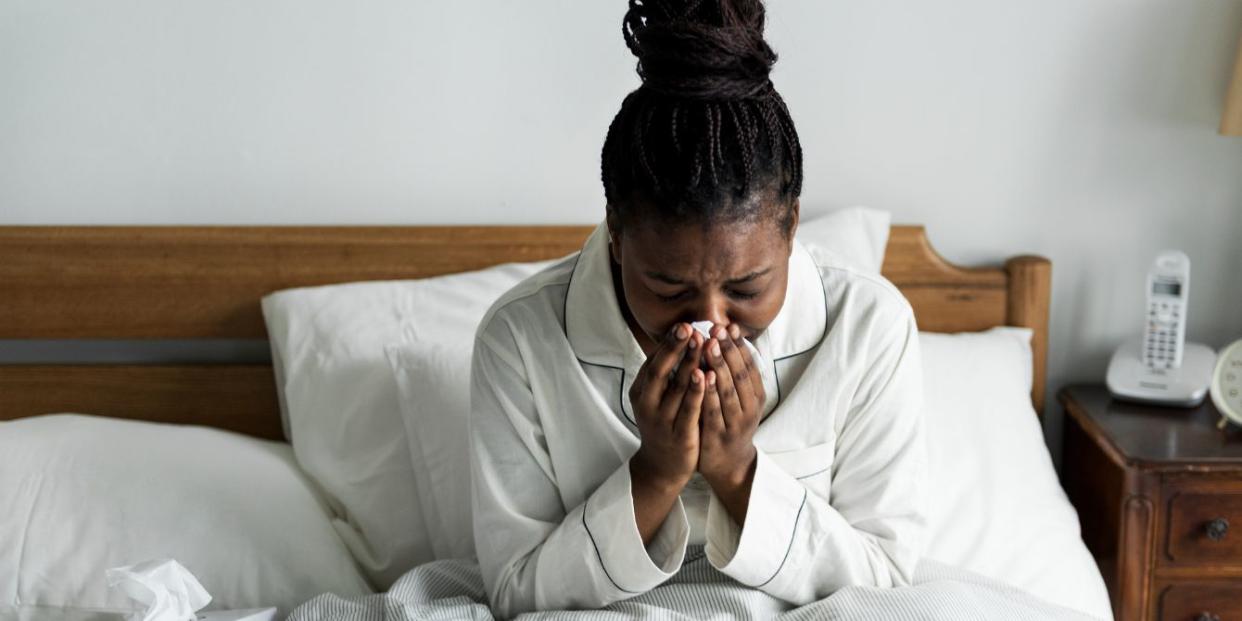It’s flu and exhaustion season

Last week, I dragged myself to work. Sneezing, sniffling and hacking. My body eventually gave out, and I had to take off multiple days. Then, the medication I took for my cold triggered an unexpected allergic reaction, engulfing me in hives—each one itching and burning, reminding me of my body’s imperfections. I soon had another prescription in hand. The doctor assured me this would relieve my itching but, more importantly, the doctor’s casual mention of its drowsy side effects was a hidden blessing to my ears. I found myself looking forward to that unexpected benefit.
The calm apartment echoed only with distant, ambient sounds of the city. I settled into bed, the soft linens cool against my inflamed skin. I began to drift, a tranquil haze pulling me under, when a sudden, piercing cry jolted me awake.
Rushing to his room, I found my 15-month-old son restless and flushed. The touch of my hand to his forehead confirmed my fears: he was running a fever. A pang of worry clenched my heart. The timing, with the medicine’s effects just beginning to set in, felt cruelly ironic. Then another pang of dread, how could I possibly explain the need to call out of work, again?
The hours of the night stretched and warped, blurring into an endless loop of trying to soothe my child, all while battling the drowsiness threatening to pull me under. I remember walking the hallway, holding him close, humming lullabies. The soft glow of the street lights outside casted long shadows on our path. His cries would wane for moments, only to return with renewed vigor.
Can anyone without a child truly empathize with the strain that parents go through during cold and flu season?
I oscillated between the bathroom, checking the medicine cabinet for anything that might ease his discomfort and the living room, pacing and rocking him in a desperate bid for relief. My mind raced, filled with concern for him and a yearning for the rest that seemed just out of reach.
With each hour that went by, the weight of my baby seemed to increase. My arms felt like jello. My whole body tugged forward, curving my spine and sending shots of pain rippling from my pinched nerve throughout the rest of my body. My anxiety also reached elephant portions as I mentally rehearsed the message I would have to give my boss if I could not show up for work again.
I thought about the workload that my colleagues would have to bear, again. The meetings I would have to reschedule, again. And how I would become known as a flakey, unreliable team member after all I had done to get to where I was.
As dawn approached, the weight of the night settled in. My body, already weary from the allergic reaction, felt doubly burdened by the physical and emotional toll of caring for my sick child and the anxiety of having to work the next day under these restless conditions. Soon my son’s cries lessened, his fever broke and he fell asleep.
I resolved to go to work, even if it meant I could not stay the whole day and had to leave early to get some rest. I chose honesty as my best course of action. I messaged my boss, telling him all that had occurred the night before and that I would do my best to be there but I knew I would not be my best self. I pondered for a minute: Can anyone without a child truly empathize with the strain that parents go through during cold and flu season?
In the hazy light of daybreak, my son cradled in my arms, I found myself reflecting on a larger issue that goes beyond the confines of a single night. Balancing parenthood and professionalism is a tightrope act that many tread daily, yet there’s a chasm between understanding and experiencing it. How can the roles of a parent and a professional reconcile when they often pull from the same well of energy, patience and commitment?
The duality of that night—wanting to be the best parent to my sick child while also being accountable to my responsibilities at work—underscored a question that often remains unspoken: At what point does society reconcile its expectations of parents as caregivers with their roles as dedicated workers? And how do we as parents help others understand that, sometimes, our best is just showing up?
That night left me wondering what the workplace would look like if everyone, whether they have children or not, truly grasped the toll that these dual roles can exact. Perhaps, in asking this, we can inch closer to a future where understanding bridges the gap between parenthood and professionalism.

